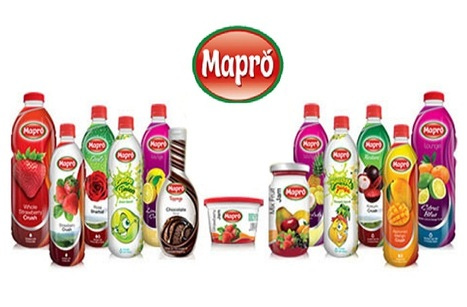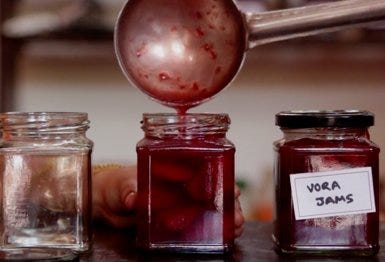SNAP #4 - The ₹500cr brand behind a tourist spot
Read Time: 5 minutes
Author's Note
Today's SNAP is about an iconic story of entrepreneurship which hasn't been talked about a lot in mainstream media but deserves to be. This piece was mainly possible because of Mr. Mayur Vora's address at Entrepreneur Social in 2018.
Mahabaleshwar, a hill station near Pune, Maharashtra contributes to around 85% of the total strawberry production in India. Mapro Garden, a strawberry farm, is the central tourist attraction in Mahabaleshwar.
More than a million tourists frequent it every year on a quest to see strawberry and other flowers bloom. But very few of them know that behind this tourist spot, is a large consumer enterprise generating around ₹500cr ($68M) in sales every year. Mapro Foods (short for Mahabaleshwar Products), a 60-year-old company that produces fruit jams, squashes, syrups and confectionery products is the enterprise behind the garden.
Strawberry farms, tourist gardens, a ₹500cr brand you (probably) haven't heard about - how did it all come to be?

The Beginning - Selling jam on a Vespa
Mapro Foods was started over 60 years ago with a small investment of just ₹800. Kishore Vora, a pharmacist by profession, observed that strawberries had a short shelf life. Due to this, farmers had to sell their produce at lower prices at times just to clear up the stock before the strawberries go rotten. He saw it as an opportunity and began procuring fresh strawberries from the local farmers to produce jam - a solution beneficial to both himself and the farmers. In 1959, he set up a small processing unit in an 8x12 feet room with two kerosene powered stoves, four vessels and a thermometer.

He started packing the jam in glass bottles and labelled them as 'Vora Jams'. Other competitors like Kissan typically had 25% fruit content. To stand out in the market, Mr. Vora ensured that his product had 45% fruit content. He would go from door to door on his old Vespa scooter selling the jam besides selling at his pharmacy. Soon, Vora Jams started getting traction and Mr Vora expanded his production base to four different houses. He also gave up his pharmacy career to focus full time on Vora Jams.

Jams aside, Mr Vohra also added dozens of new fruit products including crushes and squashes to the portfolio. To expand the company further, he got into a partnership with a friend in Mumbai in 1978. It was during this partnership that the name of the company was changed to Mahabaleshwar Food Products and Mapro was chosen as the brand name. Though the partnership got dissolved soon after, the brand name stuck. In 1983, a proper production facility was set up in Panchgani (20km from Mahabaleshwar) which would later go on to became the famous Mapro Gardens.
Change of Guard - A slew of new initiatives
By 1983, Mr. Vora had expanded the portfolio to around 300 products. But the reach of the products remained restricted to Mumbai and Pune. In the same year, Mr. Vora handed over the operations to his nephew, Mayur Vora. Mayur was a freshly minted business graduate from one of Indias top B-schools, IIM Bangalore. He had also just completed a short stint with Voltas. Under Mayur, Mapro began to transform into a company with a grander vision and sharper focus on profitability.
Among the first of Mayur's initiatives was to cut down the bulgy portfolio of 300 products. Only the best-selling ones were identified and doubled down upon. Today, Mapro sells around 70 products only.
The next was to open the Panchgani production facility to the public visitors (reminiscent of Willy Wonka and the chocolate factory). Taxi drivers in the surrounding areas were incentivized to bring Mahabaleshwar tourists to Mapro's facility - probably creating a first-of-its-kind 'referral program' where drivers received gifts based on the number of customers they brought in. With an increase in visitors, the production facility had to be expanded and a cafe was added to. Currently, close to 40lakh (4M) people visit Mapro Gardens every year. For comparison, the Eiffel Tower in Paris receives 70 lakh (7M) visitors a year. Opening up the production facility helped Mapro in three major ways:
Increase in brand recall without much advertising spend
Create a strong image of 'product made from fresh & natural fruits' in customers' minds
Create a testing ground for new products (a genius move in my opinion)

Mapro Garden
Finally, Mayur also identified opportunities for 'forward integration' for certain products. Forward integration is when a company that is producing raw materials (say milk) for a certain product (say cheese) also got into producing the final product. The reason companies forward integrate is because it results in better profit margins. Amul is an excellent example of this - a co-op of dairies that also began selling ice-creams, chocolates, cheese and other milk-based products. Similarly, Mapro which supplied strawberry syrup to ice cream companies (including big names like Kwality Walls) began to produce ice-creams under the Mapro brand resulting in higher profitability.
Strokes of Luck - Better financials
By the late 90s, Mapro had expanded distribution to most of the Western region of the country. Production needed to be increased to keep pace with rising demand. So in 1998, Mapro decided to build another production facility at Wai (near the Panchgani facility). The company reached out to multiple banks for a loan (to build the facility) but its application was never approved, due to some complication or the other. Seeing no other option, Mapro decided to slowly save up cash and build with its own money. It turned out to be a blessing in disguise. 7 years later in 2005, Mapro not only had a functioning second facility but also the rare debt-free balance sheet.
Another stroke of luck came in 2005 when the modern trade format (the large grocery stores like Spencers, More, Big Bazaar) was picking up steam. Stores were being set up across the country and standard practices from the west were being followed. One of the practice was to stock the stores with a leading brand and second-in-lead brand for every product category. In jams, Kissan was the obvious category leader. There was no other national player making Mapro the second-in-lead. Without an additional push, Mapro found itself on the shelves of all major retail chains across the country.
The final stroke of luck came in 2006 through a tax reform. Till 2005, consumer companies had to incur a huge tax expense - 16% as excise duty (tax on producing goods within a state), 15.3% in sales tax (tax on selling goods within a state) and 7% as Octroi (tax on moving goods from one state to another). This obviously had to be changed and it did. In 2006, excise duty was reduced to 8% for food products and sales tax was replaced by Value-added Tax (VAT) which was just 4% for food products. 2 years later, excise duty was completely removed for food products. This brought down tax expense for Mapro from almost 40% to a mere 10%, boosting its profitability.
The Future - Bigger, better, faster
With their jams and confectionery product lines performing well, the company has continued adding production capacity, setting up units in Satara (2006), Pune (2012) and Pathankot. Their distribution network now boasts over 400 distributors across 17 Indian states and also countries like USA, UAE, Fiji and Russia.
Sales have grown at an annual rate of around 25% for the last 15 years (🤯 ) on the back of constant innovation and product launches. A good example of this is when the company launched a pulpy fruity chewing candy "Falero" in 2008. Falero was a completely new product, becoming such a hit with consumers that even Nestle, Parle and Perfetti launched their own versions of it. Today, Falero contributes close to 50% of Mapro's revenues. Mapro also found success in the premium chocolate category through "Mazaana", a chocolate-coated nuts & dry fruit product.

With an aim to hit ₹1000cr ($136M) in sales by 2025 (double its current sales), Mapro is well on its journey to becoming an Indian FMCG giant.


I would really like to commend the team on bringing out the least talked about business stories, which have stood the test of time. Many of us are familiar with brands such as Mapro, Wagh Bakri, Rooh Afza, but very few are aware of the reasons/decisions that made these robust or ‘home-grown’. Keep up the good work team!
Thanks for brilliant informative piece.. Had been to Mapro Gradens but now more appreciative of the set up and business model behind it..